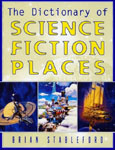

Lightspeed Magazine is a “new online science fiction magazine published by the award-winning independent press Prime Books” – It’s first issue launches June 1, 2010.
The mag is edited by John Joseph Adams, a big audiobook fan who’s also the host of The Geek’s Guide To The Galaxy podcast and Andrea Kail, a “writer, critic, and television producer who worked for thirteen years on Late Night with Conan O’Brien.”
Lightspeed is set to run a mix of straight up Science Fiction and science articles. But, most exciting of all, was this bit from the press release:
We are also pleased to announce a new member of the Lightspeed team: award-winning audiobook producer Stefan Rudnicki, who will be producing the Lightspeed Magazine story podcast.
Stefan Rudnicki is an independent director, producer, narrator, and publisher of audiobooks. He has received more than a dozen Audie Awards from the Audio Publishers Association, a Ray Bradbury Award, a Bram Stoker Award, and a GRAMMY Award for Best Spoken Word Album for Children for The Children’s Shakespeare. Outside of the audiobook industry, he’s probably best known for the dozen books he’s written or edited, from actor’s resource anthologies to a best-selling adaptation of Sun Tzu’s The Art of War. He is also president of Skyboat Road Company, Inc., the most respected independent audio production team on the West Coast.
Lightspeed will adapt two of its four stories each month to podcast format. Issue one’s podcasts are “The Cassandra Project” by Jack McDevitt and “Amaryllis” by Carrie Vaughn.
As a special feature of the debut issue, in conjunction with the popular podcasts Escape Pod and Hugo Award nominee Starship Sofa, Lightspeed will present two bonus podcasts: “I’m Alive, I Love You, I’ll See You in Reno” by Vylar Kaftan will appear on Escape Pod on June 1 and “Cats in Victory” by David Barr Kirtley will appear on Starship Sofa on June 15.
Here is Lightspeed‘s complete posting schedule for the June 2010 issue:
June 1:
Fiction: “I’m Alive, I Love You, I’ll See You in Reno” by Vylar Kaftan
Author Spotlight: Vylar Kaftan
Podcast: “I’m Alive, I Love You, I’ll See You in Reno” by Vylar Kaftan (on Escape Pod)
Editorial by John Joseph Adams
June 3:
Nonfiction: “Is There Anybody Out There That Wants to Go Fast” by Mike Brotherton
June 8:
Fiction: “The Cassandra Project” by Jack McDevitt
Author Spotlight: Jack McDevitt
Podcast: “The Cassandra Project” by Jack McDevitt, narrated by Stefan Rudnicki
June 10:
Nonfiction: “The High Untresspassed Sanctity of Space: Seven True Stories about Eugene Cernan” by Genevieve Valentine
June 15:
Fiction: “Cats in Victory” by David Barr Kirtley
Author Spotlight: David Barr Kirtley
Podcast: “Cats in Victory” by David Barr Kirtley (on Starship Sofa)
June 17:
Nonfiction: “Top Ten Reasons Why Uplifted Animals Don’t Make Good Pets” by Carol Pinchefsky
June 22:
Fiction: “Amaryllis” by Carrie Vaughn
Author Spotlight: Carrie Vaughn
Podcast: “Amaryllis” by Carrie Vaughn, narrated by Stefan Rudnicki
June 24:
Nonfiction: “Every Step We Take” by Amanda Rose Levy
Posted by Jesse Willis






 As I
As I 